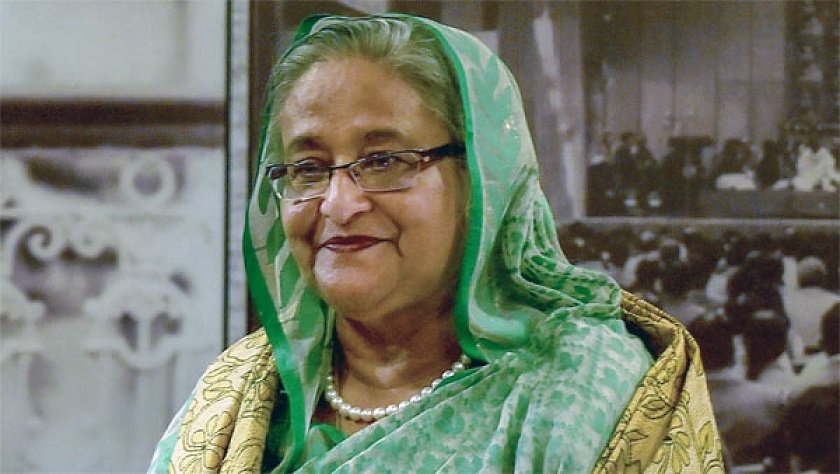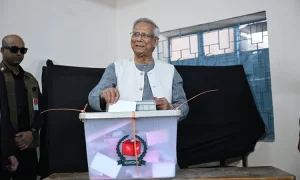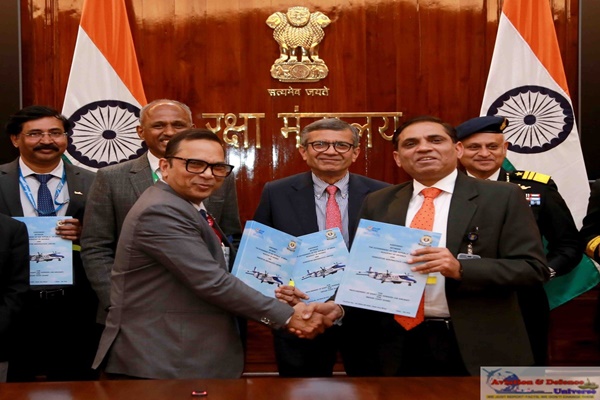
Last Updated on November 17, 2025 7:55 pm by BIZNAMA NEWS
Zakir Hossain from Dhaka
Bangladesh’s International Crimes Tribunal on Monday sentenced ousted former Prime Minister Sheikh Hasina to death after finding her guilty of crimes against humanity committed during last year’s student-led July–August uprising that toppled her Awami League government.
Hasina, 78, now living in exile in India, was convicted on two counts of ordering and enabling lethal attacks on unarmed protesters in Dhaka’s Chankharpul and Ashulia area on August 5, 2024. The tribunal also sentenced her to imprisonment until natural death for additional charges related to inflammatory remarks, use of deadly force, and the killing of student demonstrators.
Former home minister Asaduzzaman Khan Kamal was also sentenced to death, while former police chief Chowdhury Abdullah Al-Mamun, who became a state witness, received five years’ imprisonment for his role in the violence.
The tribunal ordered that the properties of Hasina and Asaduzzaman be confiscated by the state.
A Landmark Verdict: The three-member bench, chaired by Justice Golam Mortuza Mozumder, began reading the 453-page judgment around 12:30pm amid an unprecedented security lockdown around the tribunal. The verdict marks the tribunal’s first ruling on atrocities committed during the 2024 uprising.
Of the 81 listed prosecution witnesses, 54 testified before the court, including former IG of police Mamun and the investigation officer. Prosecutors submitted a 135-page charge sheet with 8,747 pages of evidence.
What the Tribunal Found: According to the judgment– Hasina bears direct command responsibility for the use of lethal weapons, drones, and helicopters against protesters. Six protesters were shot dead at Chankharpul and six others in Ashulia, five of whom were later burned after death, and one burned alive. The killings occurred under the “orders, knowledge, and inaction” of Hasina, Asaduzzaman, and Mamun. Mamun received a lenient sentence for making a “full and true disclosure” of events and expressing remorse.
Hasina and Kamal were tried in absentia after being declared fugitives. Under ICT-BD law, Hasina cannot appeal unless she returns or is arrested within 30 days.
Charges Explained: Count-1: Murder, attempted murder, torture, and inhumane acts, including complicity and failure to prevent attacks by state forces and ruling-party cadres.
Count-2: Ordering lethal weapons, helicopters, and drones against student protesters.
Count-3: Killing of Begum Rokeya University student Abu Sayed on July 16.
Count-4: Murder of six unarmed protesters at Chankharpul. Count-5: Killing of five protesters and burning of bodies in Ashulia.
Hasina’s Reaction: In written responses before the verdict, Hasina called the tribunal a “kangaroo court” run by her political enemies.
“In their distasteful call for the death penalty, they reveal the murderous intent of extremist figures within the interim government,” she said. “These verdicts are biased, rigged, and politically motivated.” She insists she never ordered security forces to fire on protesters: “God gave me life, God will take it. I never ordered anyone to shoot unarmed civilians.”
Background to the Crisis: The 2024 uprising erupted after the High Court restored a controversial quota system reserving 30% of civil-service jobs for descendants of 1971 war veterans. Students denounced the system as cronyism benefiting Awami League loyalists. Tensions escalated after Hasina labelled the protesting youths “Razakars.”
A UN report estimated up to 1,400 deaths between July 15 and August 15, mostly from gunfire by security forces.
Hasina resigned and fled Bangladesh on August 5, 2024. Parliament was dissolved, and Nobel laureate Muhammad Yunus was appointed head of the interim government.
Security on High Alert: Ahead of the verdict, security forces deployed a four-layer cordon around the tribunal involving the army, BGB, RAB, police, and APBn. Dhaka Police issued shoot-at-sight orders against anyone involved in arson or attacks.
Several crude bomb explosions were reported across Dhaka the night before the verdict, though no casualties occurred.
Victims’ Families React: Mir Mahbubur Rahman Snigdho, whose brother died in the uprising, said: “Justice for Sheikh Hasina’s wrongdoings was already served on August 5. For the crimes she committed, even a thousand executions would not be enough.”
Regional and Global Implications: The verdict is likely to trigger renewed demands for India to extradite Sheikh Hasina, but New Delhi is under no obligation to act on politically charged pressures. Her son Sajeeb Wazed has said she remains under Indian security protection. The ruling also complicates Bangladesh’s political landscape ahead of the next election, with the Awami League still banned and its leaders in exile or facing trial.







